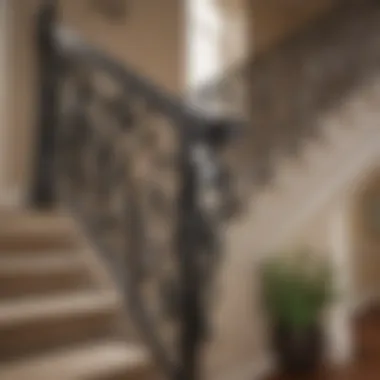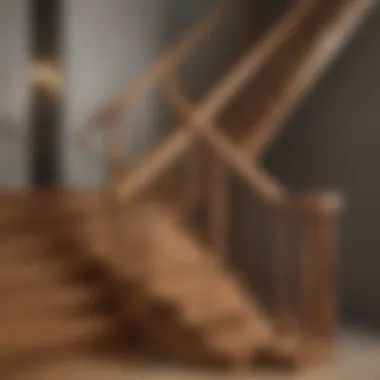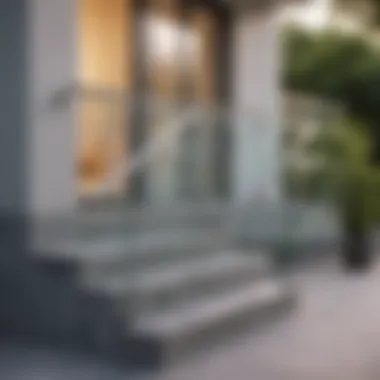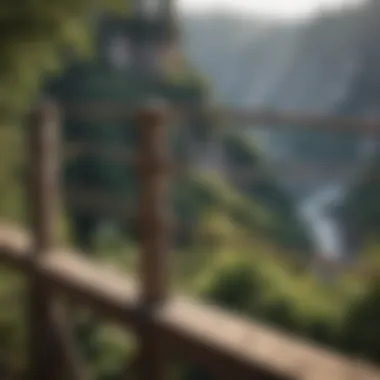Elegant and Functional Front Stair Railing Ideas


Intro
When it comes to enhancing the overall appeal of a home, the front stair railing plays a crucial role. It is not just about safety, it also shapes the first impression of the property. This guide aims to shed light on a variety of front stair railing ideas that harmonize functionality with design aesthetics. With various materials, styles, and practical tips to consider, homeowners have ample opportunities to transform their outdoor stairways into elegant entryways.
In today's article, readers will encounter multiple facets of front stair railing design. From classical wrought iron railings to contemporary glass models, each option presents its own set of benefits and aesthetic integrations. It’s imperative to select a style that resonates with the architectural framework of the home while enhancing safety measures. Notably, different climates can influence not just the choice of materials, but the maintenance practices that ensure longevity.
By the end of this comprehensive guide, readers will obtain valuable insights for selecting a front stair railing tailored to their personal taste and environmental conditions directly impacting installation and upkeep. Let's dive into key outdoor decor ideas surrounding the concept of front stair railings.
Foreword
Front stair railings are more than a simple boundary. Delivered as a pillar of architectural design, they serve essential functions while also contributing to the elegance of a home. Homeowners need to consider variables like safety, compliance, and aesthetic value, which makes a well-considered choice vital.
Importance of Stair Railings
Stair railings play a significant role in ensuring safety and security as they can prevent falls, especially when navigating steep or uneven stairs. For households with children or elderly residents, stair railings are a necessary addition. Beyond safety, they provide stabilisation when going up or down, making stairs accessible to everyone.
An exterior stair railing can greatly influence curb appeal. It conveys a first impression to all visitors. The style, material, and color of the railing can enhance se overall appearance of a home. Custom details like unique balusters or specific rail shapes may categorize the home within certain architectural themes.
Overview of Available Options
When selecting a front stair railing, consumers are confronted with a vast array of options. The following materials commonly get considered for use:
- Wood: Offers versatility and warmth but requires regular maintenance.
- Metal: Often stronger and more durable, available in types like aluminum and wrought iron.
- Glass: Provides an unobtrusive view while ensuring safety, favored for modern aesthetics.
- Composite: Made from a blend of materials to provide added benefits of both wood and plastic with low maintenance.
Different styles also adorn these materials, whether it's classic decorative features or minimalist contemporary lines. Every option contributes uniquely to increasing both aesthetic quality and safety. Researching these varieties ensures homeowners identify solutions suitable for their individual tastes and needs.
Material Considerations
When selecting railings for front staircases, the choice of material is crucial. This is due to a variety of factors, including aesthetic appeal, functionality, and maintenance. Material choices can influence the overall look of the home, while also playing a significant role in ensuring safety and long-term performance. Understanding different materials is vital in making a well-informed choice. We will examine four primary materials often considered for railings: wood, metal, glass, and composite.
Wood Railings
Types of Wood
There are several types of wood used in stair railings, including oak, pine, cedar, and mahogany. Oak stands out for its durability and rich texture, making it a preferred choice for luxury homes. Pine is accessible and lightweight but may not last as long as other types. Hardwoods, like mahogany, are favored for their elegant appearance, though they come at a higher cost. Each type of wood provides its benefits and looked.
Finishes and Treatments
Finishes applied to wood railings protect against weather and wear. A sealant or stain enhances durability and aesthetic appeal. Depending on the finish, maintenance frequency can vary. It can range from yearly checks to simple cleaning. Regular treatment keeps the wood looking its best and lasting long.
Advantages and Disadvantages
Wood railings bring warmth and class but require ongoing maintenance. While they can age gracefully, neglect can lead to rot or warping. On the pro side, wood can be customized easily through staining or painting, adding creativity. On the con side, they may need regular touchups and inspections for longevity.
Metal Railings
Aluminum vs.
Wrought Iron
Aluminum is lightweight and resistant to corrosion, making it a great option for varied climates. Wrought iron, while heavier and potentially requiring some maintenance over time, provides a classic, ornate look. Homeowners often consider either based on beauty preference and durability. Aluminum railings can complement modern architecture, while wrought iron embodies traditional grace.
Design Versatility
Metal railings offer design versatility that appeals to different styles. From minimalistic designs to elaborate crafts, these railings adapt well. They can fit seamlessly into both modern and traditional looks. The ability to use powder coating options allows more custom colors and finishes to meet one’s design ambition, which is ideal for high-end projects.
Durability Considerations
Metal railings are exceptionally durable. Whether made from aluminum or wrought iron, they can withstand heavy use without compromising structural integrity. They will resist elements when properly maintained. Its strong nature means fewer concerns of replacement, making it a cost-effective choice in the long run.
Glass Railings
Types of Glass
Glass railings come in numerous styles, often tempered for safety reasons. Clear glass gives an unobstructed view, ideal for those wanting to keep visual lines open. Frosted options provide some privacy while controlling the amount of light filtered in. The choice of glass impacts light and aesthetics, facilitating decisions tailored to individual taste.
Safety Features
Safety remains paramount with glass railings. Being thicker and treated gives glass the power to remain resilient against impacts. Adding features like stainless steel clamps boosts stability and reduces risks from shaking. It appeals strongly to a luxurious audience preferring transparent barriers, while also meeting significantly stringent safety regulations.
Installation Challenges
While beautiful when installed, glass railings may present certain challenges. Improperly fitted glass could lead to breakage or recognition of instability. Installation typically requires professional help to ensure appropriate measurements and fittings. Hence, examining the challenges related to costs and execution proves essential to any luxury project.
Composite Railings


Material Composition
Composite railings consist of a mixture of wood by-products and recycled plastics. This blend offers eye-catching aesthetics akin to wood, improved protection against water, and total resistance to rotting. They perform best in diverse climates, making them a versatile choice for outdoor spaces.
Maintenance Requirements
One attractive aspect of composite railings is that they demand minimal maintenance. Unlike wood, which may require repainting or refinishing, composite structures simply require occasional washing. This benefit appeals to those desiring elegance without additional work.
Design Aesthetics
Composite railings come in vast colors, textures, and styles, allowing for stunning design opportunities. Homeowners readily appreciate that composite includes formats copying classic wood without downsides. Being custom-made doesn’t hinder the opportunity to mingle with modern lux style needs—ideal for present homes to merging trends.
An informed selection of material seriously determines the triumph of the front stair railing project, allowing for charm in appearance and lasting durability.
Design Styles
When considering front stair railings, the design style plays a vital role in defining your home's exterior aesthetic. Each design style offers a distinct visual appeal and influences the overall character of your entryway. Thoughtful selection of these styles enhances not just the railing function but also elevates your home’s visual beauty.
Classic and Traditional
Classic and traditional designs often evoke a sense of history and craftsmanship. They embody enduring elements that are widely appreciated in architecture.
Baroque Elements
Baroque elements are characterized by their intricate details, grand proportions, and rich ornamentation. These features serve to create a bold and luxe statement in the overall design.
The fluid lines and dramatic curvature typical of Baroque designs attract those seeking to convey opulence and classical authority. However, they may include complexity that could necessitate extensive maintenance over the years. Yet, for high-end properties, their elaborate nature becomes their distinctive strength.
Colonial Influences
Colonial influences in stair railing designs hark back to simpler yet elegant styles that emphasize symmetry and proportion. The unique characteristic of these railings often stem from their use of straight lines and sturdy posts.
This type of railing contrasts charm with structural strength, making it suitable for various exterior styles. Though they resonate well in many settings, it does require a commitment to preservation to shine over time; regular upkeep remains necessary to avert neglect and wear.
Rustic Features
The rustic design offers a warm and inviting ambiance, staying true to natural aesthetics. The key characteristic observed in rustic railings is a reliance on natural materials, typically including unrefined wood and metal accents.
This style appeals particularly to those appreciating a blending of indoors and outdoors. The unique aspect of rustic features thrives on imperfection, presenting beauty in wear and tear. However, one must acknowledge that the investment in proper sealing and care is crucial to maintain the railing's rustic charm over time.
Modern and Contemporary
The modern and contemporary styles reflect a progressive shift in design principles. It emphasizes function while breaking away from the bulky presence of traditional designs.
Sleek Lines
Sleek lines characterize modern stair railings with their simple yet sophisticated presence. Such designs create a sense of spaciousness and flow by stripping away intricacies.
Ideal for modern homes, these lines can provide a fresh canvas that blends seamlessly with minimalistic facades. However, these continuous necessities in upkeep against scratches may limit their practicality if not accurately addressed.
Minimalist Approach
Minimalism underscores a philosophy founded on ‘less is more.’ Using uncomplicated, functional features marks these railings a practical yet appealing choice.
Their understated design speaks volumes in contemporary homes. Nevertheless, minimalistic design often demands quality materials, suggesting that cheaper alternatives could falter in strength and durability over time.
Integration with Architecture
To integrate with architecture means to create harmony between your railing and home structure. This characteristic solidifies the overall design, thus supporting coherent design decisions between all elements of building materials.
This homogeneity results in a polished look that enhances appeal but demands careful planning and a holistic view of the outdoor space.
Farmhouse and Vintage
Evoking nostalgia, farmhouse and vintage styles contribute to a cozy environment. This unique style reconnects us with simpler times often reflecting authenticity and warmth.
Use of Reclaimed Materials
Utilizing reclaimed materials in stair railings speaks to sustainability and resourcefulness. The impactful ethos stays rooted while promoting the pivotal aesthetic of authentic patina.
This lends itself to bespoke designs that breathe stories of their origin. However, regional variances could sometimes make sourcing recycled materials a time-consuming pursuit.
Charming Accessories
Charming accessories breathe life into any vintage stair railing. These include finials, planter brackets, or decorative posts, which invite personal touches to reflect individual character.
Despite their possible cost implications, attention to accessories greatly influences your railing's character. Then again, discerning which accessories will hold while communicating your desired context represent balancing acts for the homeowner.


Weathered Finishes
Weathered finishes project character while providing a rustic charm. Often achieved through techniques that replicate aging processes, these finishes afford depth.
The unique feature extends to easy installation; however, achieving boxing pre-patinated wood might consume more resources than using new materials.
Industrial
Industrial railings conjoin minimalistic elements with textures that resemble warehouse characteristics — marrying raw with sophisticated.
Mixed Material Use
Mixed material use exemplifies adaptability. This incorporation of metals, wood, and glass accentuates a rough yet stylish appeal while allowing ample creativity in design creations.
Nevertheless, balancing these materials will require well-planned installations to ensure coherent integration. Frequent experimentation possesses potential risk if executed unexpectedly.
Bold Designs
Bold designs break constraints while challenging conventions. Characteristic visuals incite impressions that drive attention toward architectural variations.
This feature appeals to home entrances desiring expressive solutions. Yet, their strong nature can feel overwhelming in small scale contexts; installation tends also to become an evident challenge according to desired aesthetics.
Functionality and Aesthetics
Functionality and aesthetics govern industrial railings principles, shaped to prioritize users yet designed with remarkable design emphasis. Designs present structural integrity alongside striking features.
It reflects genuine thought yet can misalign visuals if adequately approached. Correct configuration renders them classics appealing amidst sophistication, augmenting potentials while remaining informed of building applications.
Color Options
Color selection plays an essential role in enhancing the visual impact of front stair railings. It can contribute significantly to the overall appeal of your outdoor space and can either harmonize with the surrounding environment or serve as a striking focal point. Choosing the right colors can elevate a simple structure to something that resonates with style and elegance. Here we will explore three primary color options: neutral palettes, bold accents, and natural finishes.
Neutral Palettes
Neutral palettes offer an understated sophistication that can complement a variety of architectural styles. Common neutral colors are shades of white, gray, and beige. These colors facilitate versatility; they pair well with traditional or modern homes without clashing with other elements of design.
Choosing neutrals can often make your stair railings appear classic and timeless. They allow for an effortless integration into your home’s landscape. Installing railings in a neutral palette may also decrease the chances of frequent redesigns, saving costs over time.
Benefits of using Neutral Colors:
- Balance: Neutral tones maintain a balanced aesthetic, ensuring the focus remains on landscape and architecture.
- Adaptability: These colors easily coordinate with plants, flowers, and seasonal decor.
- Longevity: Neutral shades can resist the test of time, remaining in vogue throughout the changing trends.
Bold Accents
Contrasting dramatically with neutral palettes, bold color accents serve to make a statement. Choosing vibrant hues like deep blues, reds, or even bright yellows can impart energy to your front entryway.
Bolder colors can be particularly effective in settings where the staircase requires visual emphasis or in more vibrant architectural contexts. These can define boundaries and create an impressive first impression.
However, the use of bold colors necessitates careful consideration. You need to ensure they harmonize rather than clash with the immediate environment and other design elements. This approach can lead to stunning results while also being an excellent way to express personality and individuality.
Considerations for Bold Colors:
- Contrast: Evaluate how the bold color interacts with surrounding elements, including the earth, greenery, and other architectural features.
- Maintenance: Dark or vibrant colors may require more upkeep due to fading or exposure to various climates.
Advanced tip: Look to local trends when selecting bold accents. This can improve the aesthetic connectivity with the community.
Natural Finishes
Natural finishes bring an earthy, organic feel to front stair railings. This choice often highlights wood tones, metal surfaces, or finish treatments that have been cultivated over time. Eamphasizing the natural grain or texture can provide an unparalleled charm.
Options for incorporating natural finishes may include timber railings treated with oils or wax to accentuate grain patterns, or reusable metals that patinate naturally over time, providing unique aesthetics with weathered character.
Benefits of Natural Finishes:
- Eco-friendly: This option is often more sustainable and conducive to an environmentally aware lifestyle.
- Unique Beauty: As no two natural pieces are the same, finishes grant individuals a truly unique railing.
Choosing the right colors for stair railings can elevate outdoor spaces significantly, transforming basic access into a classy entry to your abode.
Maintenance and Care
Maintenance and care are crucial elements that can significantly increase the longevity and aesthetic appeal of your front stair railings. Proper upkeep ensures that railings not only look good, but also serve their essential functions in providing safety and security to those using the stairs. Regular attention to this aspect helps guard against wear and tear, resulting from environmental factors and everyday usage. Investments in material selection should be paired with a consistent maintenance strategy, allowing homeowners to fully realize the benefits of their railing systems.
Regular Inspection
Regular inspection is the foundation of a sound maintenance plan. This process involves checking for visible defects, structural integrity, and any signs of deterioration. Conditional checks should preferably occur at least once a season, with the aim of identifying any problems early. Homeowners may want to focus on several areas during these inspections, including:


- Tightness of fittings: Ensure all bolts, screws, and fasteners are secure.
- Material condition: Observe for any cracks, rust spots, or rotting areas, depending on the material.
- Paint and finish: Keep an eye out for peeling paint or finishes needing touch-up.
Addressing these concerns early can prevent more costly repairs or even replacements in the long run.
Cleaning Solutions
Keeping railings clean is an ongoing task that varies depending on materials used. For instance, wood railings may need periodic washing with mild soap and water, followed by a gentle scrub to remove any dirt or grime. Metal options, such as aluminum, might require specific cleaners designed to combat corrosion. A regular cleaning routine can enhance both durability and appearance. Here are a few commitment tips for maintaining cleanliness:
- Frequency of cleaning: Where dirt build-up is common, a monthly cleaning schedule is advisable.
- Appropriate cleaning agents: Use non-abrasive products that will not damage the railing surface.
Adopting a diligent approach towards cleaning not only uplifts the visual impression of your property, but also facilitates longevity of your railing.
Repairs and Replacement
Despite the best care, railings may require repairs or eventual replacement due to damage or failure over time. Recognizing when to repair rather than replace is crucial. Typically, structural issues or extensive rust spots in metal railings necessitate serious evaluation. Use these guidelines when considering repairs:
- Assess the extent of damage: Minor scratches may just need refinishing. More severe issues likely require professional input.
- Professional assessment: For severe corrosion in metal or significant rotting in wood, professional consultation often recommended.
- Budget considerations: Evaluate if immediate repair makes sense financially compared to total replacement in utfuture.
Regular evaluations and cleanings could delay the need for more extensive repairs. Utilizing reliable service providers is critical when it comes to any repair or replacement decisions, ensuring that aesthetics and safety remain uncompromised.
“Preventive care is always better than remedial action.”
By prioritizing maintenance and actively caring for your stair railings, you ensure they function effectively while contributing to the overall charm of your front entryway.
Installation Process
The installation process plays a crucial role in the overall effectiveness and aesthetic of front stair railings. Proper installation ensures that the railing system adheres to safety standards, enhances the visual appeal of the staircase, and establishes a seamless connection with the architectural design of a home. This section will provide insights into two distinct approaches: hiring a contractor and opting for a DIY installation. Each method has its placed merits and considerations, allowing for a tailored approach to your specific needs and skills.
Choosing a Contractor
When selecting a contractor for the installation of stair railings, it is vital to consider experience, reputation, and references. Professional contractors not only assure quality installation but also bring expertise in adhering to local building codes. Furthermore, they can often provide valuable guidance on design choices that complement your staircase.
Key points to remember include:
- Verify the contractor’s license and insurance. This will protect you from any liabilities that may arise during installation.
- Request and review past project photos to evaluate their work style and finished results.
- Collect multiple quotes but remember that the cheapest isn't always the best.
Hiring a contractor may present a slightly higher initial cost, but it often results in improved durability and a polished finish.
DIY Installation
For those with a penchant for hands-on projects, a DIY installation can be rewarding. It can save on labor costs and allows for a personalized touch. However, careful planning is essential to ensure safety and compliance.
Tools and Equipment Needed
Equipping yourself with the right tools is essential to a successful diy railing installation. Critical tools include:
- Drill: Needed for making accurate holes for railing posts. A quality drill will facilitate smoother work.
- Measuring Tape: Precision in measurements avoids costly adjustments later.
- Level: Ensures the railings are installed straight, which adds to the appearance and safety.
- Screwdrivers and Wrenches: Required for securing the components tightly.
The benefit of using proper tools is not only in efficiency, but also in achieving an installation that stands sturdy over time. Investing in quality tools can provide excellent long-term value. On the downside, these tools can be costly initially for those who do not already have them.
Step-by-Step Guide
A well-structured step-by-step guide simplifies the process for the diy-er. Key phases include:
- Design Planning: Draft your railing layout, making certain it aligns with safety codes.
- Material Gathering: Purchase all materials according to your design.
- Preparation: Clear the stairway and secure the work area.
- Installation of Posts: Attach railing posts securely to provide foundational strength.
- Affixing the Railing: Ensure that the railing is installed tightly and independently meets safety guidelines.
- Final Checks: Reassess all work for stability and aesthetics.
Following a well-thought-out guide takes the guesswork out of installation, saving time and increasing safety. It might demand substantial elapsed time from the installation than hiring a professional, but the rewarding feeling of successful completion can be significant.
Final Considerations
In assessing front stair railing ideas, the final considerations serve as crucial checkpoints before the actual implementation of your project. These elements help in ensuring that the selected railing not only enhances the visual aspect of your home's entryway but also adheres to the necessary safety standards. Each choice impacts the overall appearance, practical function, and security of the exterior stairways, making deliberation essential.
Balancing Safety and Aesthetics
Achieving a harmony between safety and aesthetics is a high priority for any stair railing project. A beautiful railing can enhance the curb appeal, but if it fails to meet safety requirements, the beauty serves little purpose. Railings must be constructed at the appropriate height and secured correctly to prevent accidents.
Key Points to Consider:
- Height Standards: The height of the railing should comply with local building codes to provide a protective barrier.
- Material Integrity: Some materials, while visually appealing, may not provide adequate support. For example, glass railings offer minimal obstruction, yet they must have robust installation techniques.
- Wider Steps: Wider or deeper steps require railings that extend further out for effective grasping.
Striking this balance ensures both elegant style and necessary durability in function. Proper planning takes into account elements like foot traffic and will still allow for aesthetic choices.
Legal and Building Code Compliance
Compliance with legal regulations around railing installations cannot be overstated. Every locality has regulations that dictate which materials and designs are allowable as well as their specific dimensions. Familiarity with these codes will eliminate issues during inspections and future liabilities.
Consider the Following Factors:
- Consult Local Codes: This can save you headaches down the road, preventing costly adjustments if guidelines are not met.
- Professional Insight: Engaging with an experienced contractor ensures compliance, as their expertise navigates these codes while coupling functionality with beauty.
By being proactive regarding legal considerations, you will mitigate risks associated with not complying. That leads to a more secure and beautifully designed railing system. Further navigation through these aspects can reinforce decision-making during the railing installation process.
Exploring the meticulous details within your project and staying informed about regulations lays the groundwork for success in achieving the perfect front stair railing.







